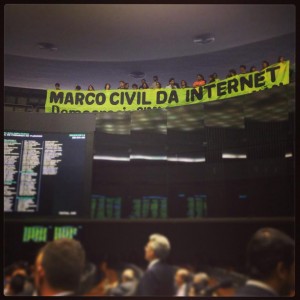STATEMENT BY GIL IN ENGLISH AND THEN PORTUGUESE AND THEN A COMMENTARY BY Luiz Fernando Moncau (@lfmoncau)
Pedro Nicoletti Mizukami (@p_mizukami)
Former Minister of Culture Gilberto Gil (pictured ) is the main promoter of an online petition that calls for " a free and democratic Internet." The petition , available at Avaaz , seeks the full vote of the Civil Framework Internet , preserving net neutrality . The text , signed by the singer , asks lawmakers to stand firm against the lobbying of telecommunication companies and that no users lose their rights because of the profit of private companies .
The petition already has almost 140,000 signatures , and reached a staggering 100,000 supporters in less than 6 hours in the air . See text signed by Gil :
" I believe the Civil Marco is the best bill that has already entered the Congress , because it was made by all of us, collaboratively the network ! It limits what information providers can save and establishes strict criteria for enterprises: with Marco Civil , providers are prohibited from using our data to sell services without our express permission . But some MPs are giving the telecoms lobby , and if this maneuver is successful, we can say goodbye to the internet we have today .
The phone companies say , to create differentiated packages may cheapen the internet . But if we allow companies to decide the speed of access to each type of content , will be the end of creativity and innovation that spontaneously appear on the network . We can not allow the internet to be divided into packets of services tasteless , poor quality and controlled by a few companies .
Sign the petition now and Avaaz will deliver our voices directly to Members who support this idea and put pressure on those who oppose the Civil Marco . We will take back our internet before they screw it up :
http://www.avaaz.org/po/o_fim_da_internet_livre_gg/?bVXAheb&v=37036
My generation fought for the democratization of Brazil and the guarantee of freedom of communication. We can not leave now that important achievements disappear before the irresponsible lobby of a handful of companies and the lack of commitment of members who believe they can ignore their constituents .
With hope and determination ,
Gilberto Gil "
M PETIÇÃO ONLINE CONTRA ‘MARCO CIVIL’, GIL PEDE INTERNET DEMOCRÁTICA
GIL LIDERA ABAIXO-ASSINADO CONTRA O TRAIÇOEIRO ‘MARCO CIVIL’ DA INTERNET
Publicado: 10 de março de 2014 às 19:46 - Atualizado às 21:38
Por: Rodrigo Vilela
O ex-ministro da Cultura Gilberto Gil (foto) é o principal representante de uma petição online que defende “uma internet livre e democrática”. A petição, disponível no site Avaaz, pede a votação integral do Marco Civil da Internet, preservando a neutralidade da rede. O texto, assinado pelo cantor, pede que os parlamentares se mantenham firmes contra o lobby das empresas de telecomunicação e que nenhum usuário perca seus direitos por causa do lucro de empresas privadas.
O abaixo-assinado já conta com quase 140 mil assinaturas, e alcançou a impressionante marca de 100 mil apoiadores em menos de 6 horas no ar. Veja o texto assinado por Gil:
“Eu acredito que o Marco Civil seja o melhor projeto de lei que já entrou no Congresso, isso porque foi feito por todos nós, de forma colaborativa pela rede! Ele limita quais informações os provedores podem guardar e estabelece critérios rígidos para as empresas: com o Marco Civil, os provedores serão proibidos de usar os nossos dados para vender serviços sem a nossa autorização expressa. Mas alguns deputados estão cedendo ao lobby das telecoms e, se essa manobra for bem sucedida, podemos dizer adeus à internet que temos hoje.
As empresas de telefonia dizem que, ao criarem pacotes diferenciados, poderão baratear a internet. Mas se permitirmos que empresas decidam a velocidade de acesso a cada tipo de conteúdo, será o fim da criatividade e inovação que aparecem espontaneamente na rede. Não podemos permitir que a internet seja dividida em pacotes de serviços sem sentido, de má qualidade e controlados por poucas empresas.
Assine a petição agora e a Avaaz entregará nossas vozes diretamente aos deputados que apoiam essa ideia e pressionará aqueles que são contrários ao Marco Civil. Vamos tomar de volta a nossa internet antes que eles estraguem tudo:
http://www.avaaz.org/po/o_fim_da_internet_livre_gg/?bVXAheb&v=37036
A minha geração lutou pela democratização do Brasil e pela garantia da liberdade de comunicação. Não podemos deixar, agora, que conquistas importantes desapareçam diante do lobby irresponsável de um punhado de empresas e da falta de compromisso de deputados que acreditam que podem ignorar seus eleitores.
Com esperança e determinação,
Gilberto Gil”
